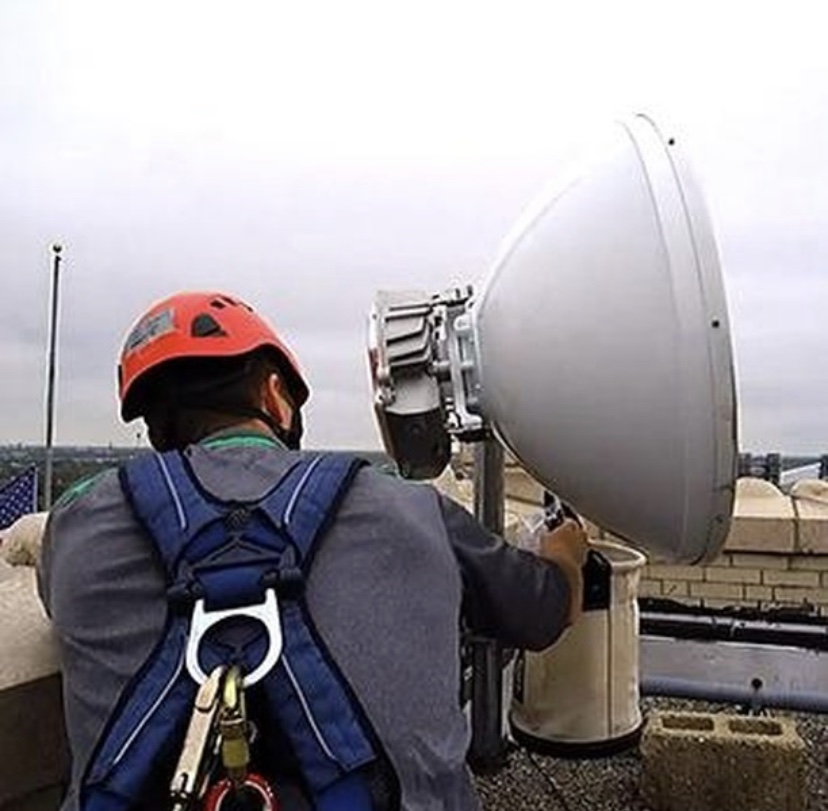
For most of us, the Internet has become a constant fixture. Imagine a day without using Google, posting photos online, or checking your email! The same can be said of businesses who consider the Internet as an indispensable tool for their daily operations — from video conferences, employee training to large file downloads.
Whether you’re a solopreneur or running a team spread across the country, a day without Internet connectivity, or even just super slow connectivity speed, could translate to decreased productivity and even worse, profit loss. Internet connectivity is so valuable that fiber connectivity can boost value to real estate properties.
While it’s incredibly easy to sign up for the first Internet access provider offer you’ll come across, smart business owners understand that choosing a broadband provider means carefully taking stock of several variables before making the decision.
Our bandwidth solutions services cover a wide spectrum. These include:
- Enterprise Wireless
- Fiber Optics
- Internet Service
- MPLS
- Point-to-Point services


What Companies Need from Business Internet Access Providers
At the end of this article, you will have a clearer picture of what you should require from business Internet access providers the next time you’re shopping for the best in your area.
1. Sufficient Bandwidth
This is one of the key requirements that business owners and managers should thoroughly evaluate. Of course, your bandwidth needs will depend on the nature and size of your operations. With this in mind, begin your assessment with the following questions:
- How fast do you really need your Internet connectivity to be?
- How much bandwidth do you anticipate requiring?
- How many devices do you estimate are going to need to transfer data?
- Do you need point-to-point connectivity?
Once you’ve answered those questions, your next step is to learn about the different types of high-speed Internet options. Here’s a primer of your options:
Ethernet over Copper/DSL (Digital Subscriber Line)
This is an old Internet technology (in the case of DSL, the successor to dial-up modems). It is affordable yet unreliable by today’s standards. This type employs local telephone lines to transmit data, and the farther you are from the line, the more sluggish connection you get.
Cable
Cable Internet mainly relies on standard coax cable lines that were originally run to provide television service. This is one of the most popular options for both residential and business customers. Speed may be slower during peak hours because bandwidth is shared among users in the vicinity.
Fiber
For businesses, this option is obviously better than DSL or cable. For one, as we noted in fiber-optic internet vs. copper cable, you almost always get equal download and upload bandwidth.
Fiber also provides scalability — you can start with 10 megabytes today, and if you need 100 megabytes (or much more), your provider can easily increase your bandwidth. Simply contact your provider, who can increase your fiber bandwidth immediately without a service call or installation projects.
One easy way to check on fiber internet availability in your area is to request a free evaluation by contacting WaTech Computer Services.
2. Focus on Security
This is another variable that should be on top of your list. Data center security poses one of the biggest Unified Communications risks to small businesses.
Sure, there are lots of provider options out there, but not everyone can guarantee that you will be protected from spam, spyware, viral threat, and even intrusion. The company should be committed to security, even down to doing background checks on their own employees. A good guide is to see if the company undergoes an audit validation which does address how security is managed and maintained.
3. Shorter Installation Timelines
Most ISPs take 30 to 60 days to set up a connection to a new location. When shopping for your business ISP, you and your provider should be working closely with regards to timetables and expected delivery times.
4. Accessible Support
When things go south on your connection, you need customer support who goes the extra mile. Yes, it’s all about computers, servers, and bits of data, but if your ISP lacks that human touch, it’s probably high time that you switch business internet access providers. In most cases, solid customer support is even worth the extra expense. Apart from fantastic customer care (check online reviews!), opt for a provider who offers 24/7 technical support.
5. Timely Troubleshooting Response
How quickly does the ISP respond to a reported outage or send their field service techs on site if a failure occurs? Check for field response policies and make sure that they meet your business needs as well as possible worst-case-scenarios. Often, it takes a day or two for a team to fix outages by being physically present in the area. Imagine how a day’s worth of delay will impact your business.
6. Offer Business Phone Service
There are a lot of advantages to combining business internet and phone services. Not only can you expect to save on cost, you skip the hassle of multiple bills, support systems, and the runaround you often find when dealing with separate vendors. When you have issues, you won’t get the “It’s the VoIP provider’s fault” excuse.
7. Future-Oriented Mindset
These days, everything evolves so rapidly that you never know when a new Internet technology will surface. This is why it pays to work with a provider who understands the need to be future-oriented.
Take IPv6 for instance. It is the next generation protocol for IP addresses. If your business is willing to push the envelope when it comes to technology, it pays to have an ISP who shares your enthusiasm.
8. Reliable Upload and Download Speeds
Does your enterprise require faster-than-normal upload and download speeds? Or do your operations require only the usual web browsing and mail setup? Your answer plays a role in choosing the right business Internet service for your needs. Plus, you need to consider how many users will be connected at one time, and what they will be doing while online e.g. do they need to check emails, share files, or upload videos constantly. Also, is your ISP throttling bandwidth at certain times during the day or when using certain services?
9. Routing
At its core, the Internet is the global system of interconnected computer networks that use the Internet protocol suite (TCP/IP) to link billions of devices worldwide. An Internet Service Provider (ISP) connects your office network to the many interconnected computer networks that make up the Internet. The ISP connects to these networks via transit (paid) and non-transit (non-paid) connections. The connection to every network in the world is known as a route.
When you choose an ISP, whether they have transit or non-transit connectivity (in most cases it is a combination of both), what your business cares about is being able to get to every network in the world which you need to connect to for your business to succeed. Shockingly, there are major United States-based national ISP’s who refuse to pay any transit fees for connectivity, and they, therefore, cannot connect you to the entire Internet even here in the U.S., as they have been unable to negotiate non-transit agreements with every carrier.
Making the Right Decision
As always, knowledge is power. Knowing what you should look for in an ISP can spell the difference between profit and loss; between achieving optimum production and poor delivery times. Still, you alone know the full nature of your business and operations.
The takeaway is to find an ISP who makes an effort to understand your business needs, and who can make adjustments to accommodate both your short-term needs and long-term goals.
Haven’t made the decision yet? Ask a trusted expert for more insights on how to choose the best Internet access provider for your enterprise.

Switching Internet Service Providers
Do you want faster internet? Better customer service? Lower monthly rates? No contracts? Knowing the specific reason you want to switch providers will help you avoid going through the cost and hassle of switching only to wind up in a similar (or worse) situation.
While you likely have more than one reason, you should prioritize them in order of what’s most important to you. This will help you zero in on the best internet provider available for your needs.
No matter why you’re switching providers, or even if you’re not, you should definitely know how fast your broadband internet needs to be for your business. For example, streaming video requires a lot more bandwidth than browsing Google.
Step 2: Find the costs of canceling your current internet service.
Cancellation Fees
If you’re under contract with your current ISP, you could face a hefty fee by canceling early. Make sure you consider this before canceling, especially if saving money is your main reason for switching.
Below you’ll find a list of major ISPs that offer internet plans with contractual agreements and early cancellation fees.
Some of these ISPs offer no-contract options too. Plus, the policies and amounts of the cancellation fees may have changed since the time you signed up for service. So, while you can use the chart above as a reference when choosing your next provider, it won’t tell you the specifics of your service agreement.
You’ll need to review your service agreement to know if your ISP charges early cancellation or termination fees and how high those fees might be. If you didn’t save a copy of the paperwork you signed when you set up your broadband internet service, you can usually find it online when you log into the account you set up with your ISP.
You can always call your ISP to get this information, but keep in mind if you start asking questions about cancellation, you could get routed to a retention specialist. Those conversations can turn into negotiations. We want to fully arm you with all the information you need before you enter that negotiation, so we recommend finding your service agreement information another way if possible.
Keep in mind that this chart is for internet-only packages. If you have a bundled package (any combination of internet, TV, or phone service on the same bill), you may still be under contract even if your ISP isn’t listed here. Check your service agreement for details.
Equipment Compatibility and Returns
Different ISPs use different equipment, so if you purchased your modem from your previous provider, it may not be compatible with other ISPs.
If your company didn’t purchase your modem and instead rent one from your ISP, you will need to return that equipment. It can be a hassle, and you’ll have to pay shipping in some cases. Remember to include that cost when adding up how much canceling your current internet service could cost you.
Step 3: Find the other Internet Service Providers in your area.
Once you know how much getting out of your current service agreement will cost you, you need to find out what alternatives you have. We’ve made this part simple. Enter your zip code in the box below, and we’ll show you a list of the ISPs that offer service in your area.
Step 4: Pick a provider that matches your needs.
By now you should know what to avoid and how much speed you need. Here are a few more factors you may want to consider before deciding which ISP is right for you.
What should I consider when choosing broadband internet service?
Availability
You should always consider availability first because it will save you time. Finding the perfect broadband internet provider won’t do you any good to if it doesn’t offer service in your area.
Speed
Click the button below to use our “How much speed do I need?” tool. We’ll recommend an internet speed based on how you use the internet.
Monthly Cost
In most cases, ISPs offer lower prices when you sign up, then increase the price after the introductory period. The specifics, like the initial price, the length of the promotional offer, and the long-term price, will all depend on the package you choose. Make sure you check the terms and conditions for these details.
Up-Front Costs
Some ISPs charge installation and setup fees; others offer free installation on certain packages. Pay attention to the fine print to know what terms the ISP offers. For more about up-front costs, contact WaTech Computer Services and we will do all the leg work for you.
Reliability
Figuring out how reliable an ISP is will be difficult. For some concrete numbers, you can check outage history at downdetector.com. However, just knowing the raw statistics doesn’t tell you the full story.
Customer Service
Customer service can include anything from helpful sales reps to online tech support options. You can also use our customer satisfaction survey from the link above to compare customer satisfaction with each ISP’s customer service.
Bundling Options
If you want both cable TV and broadband internet services, you’ll want to know the bundling options (and associated savings) offered in your area. Bundling specifics and monthly costs will vary by provider or package.
Choose your next broadband internet provider.
By now you know what you want to avoid, how much switching will cost you, and roughly how much speed you need. You know which providers are available in your area, how fast they are, and how satisfied their current customers are with different aspects of their service.
Based on your research, you should have a pretty good idea of which ISP best fits your needs and whether or not it’s worth the switch.
Take note of all of that info, because the game is about to change.
Step 5: Call your current ISP.
This call is not to cancel your service. You don’t want to cancel before you activate your new service or you might end up without internet for an undetermined amount of time. However, since you now know exactly what package you expect to change to, you’re ready for that conversation with the retention expert. Sometimes what starts out as an intent to switch providers results in a better deal with your current provider.
Because you’ve done your homework and know the specifics of the internet package you plan to switch to, you can compare them to any discounts, perks, or promotional deals the retention agent offers you. This should simplify the decision between reupping with your old provider under new terms or continuing with your plan to switch.
If your company decides to stay with your current provider at this point, you’re done—and hopefully you’ve got a better agreement with your Internet Service Provider. If not, don’t commit to cancellation just yet because you want to set up your new service first. Simply tell the representative you need to think about it more.
Step 6: Order your new service and schedule an installation date.
At this point, you know what you want and you’re ready to switch, so go ahead and call your new provider to order service. Be sure to schedule your installation and mark down the date.
Step 7: Cancel your old internet service.
Do not cancel your old service until your new service is installed and working properly. If you do, you could end up with a gap in your service. If you use your internet connection for business, that service gap could cost you. Once your new ISP installs and activates your new service, go ahead and cancel your old service. You can do so by calling the ISP or visiting your online account.
Enjoy your new setup!
Whether you switched internet providers or just negotiated a better deal with your current ISP, you should enjoy a better internet agreement if you followed these steps. Don’t forget to relay this info to your friends if they need to switch, and keep WaTech Computer Services in mind for all your internet questions.

